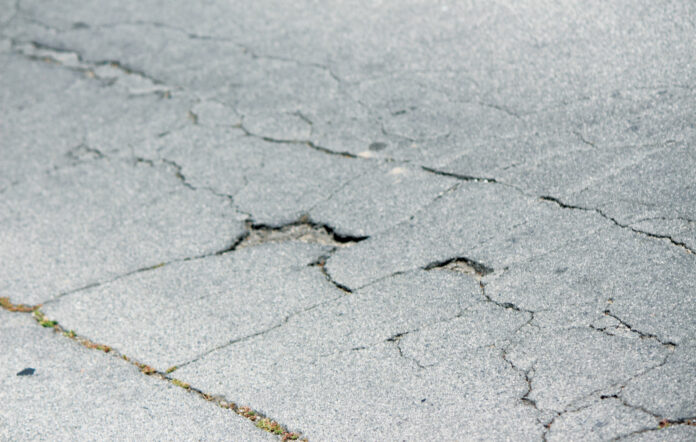
At its most recent regularly-scheduled meeting, Scotts Valley City Council heard from a consultant that it didn’t do so well on the pavement condition index (PCI), with more than a third of its roads rating “poor” or “failed.”
Scotts Valley has 32.1 miles of paved routes—an asset worth nearly $53 million, not including sidewalks, signals, markings or storm drains, according to the presentation from Nichols Consulting Engineers. However, 35.2% of this transportation network is considered to be in “good” condition, at least for now.
The index is measured on a scale of 100. Watsonville and Santa Cruz both score at the statewide average of 65, while Scotts Valley comes in below-average at 60. It’s performing better than Capitola (at 54) and Santa Cruz County (at 48).
Scotts Valley uses a combination of hot mix asphalt and slurry seals to maintain its vehicle pathways.
At the June 7 meeting, council members discussed a variety of approaches to improve the City’s road health. They heard the community is facing about $24.7 million in road maintenance in the coming decade.
Vice Mayor Randy Johnson said he was alarmed at the results of the report.
“When we look at what our responsibilities are as a City… infrastructure’s right up there,” he said. “I think Measure D is probably a cautionary tale.”
What he meant by that is that Scotts Valley doesn’t get as much money from a recent tax measure to fund capital repairs as some local officials think it should.
“A half-cent sales tax is a lot of money,” he said, suggesting if Scotts Valley had levied a half-cent sales tax on its own citizens, it would’ve ended up with a bigger pot from which to fund things like road resurfacing.
That would’ve generated perhaps more than a million dollars, compared with the hundreds of thousands less Scotts Valley gets from Measure D, he said.
Instead, Johnson says the money has been going to fund Highway 1 upgrades and to pay for a trail and/or a train along the coast.
Councilmember Allan Timms said he, too, is alarmed at the state of the pavement.
Councilmember Derek Timms wondered if it might be possible to tax delivery vehicles, which have become more popular, with the shift to online retail, particularly during the pandemic.
The consultant presenting the report said she’d look into it, although the Council heard these are generally smaller vans that aren’t doing the worst damage to streets.
Timm noted that taking on debt hadn’t been suggested as a way to fix the road issues.
“Our revenues are not keeping up with expenses,” he said. “Is bond funding an option?”
City Manager Mali LaGoe said, with another bond coming off the rolls, that could be a realistic way to go.
The Council also considered the experience of other Greater San Francisco Bay Area suburbs in terms of the fees they collect for various activities within their borders, such as utility work.
Timms said he appreciated the detailed analysis.
“We should be striving for higher grades here on our streets,” he said, “and the way to do that is prioritization.”
No action was taken on the item during the meeting.
Public Works Director Chris Lamm said staff will be working on an update to the City’s impact fees through the summer.













IF you think that Scotts Valley has poor roads come check out the SLV area. Ha!
Worst county road maintenance program in the entire Bay Area. Simple drive to any other local county to see their general road conditions verifies that fact. They blame problems on storms, but hardly ever do proactive road maintenance . Embarrassing.